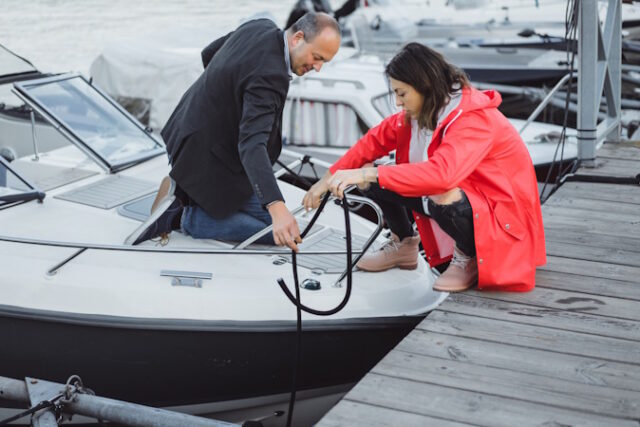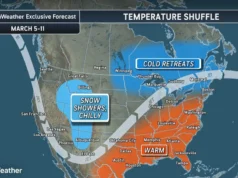
Boat owners will find bliss on South Florida’s gorgeous coast. However, the area’s susceptibility to hurricanes creates particular challenges that call for readiness to shield your vessel from storm damage. Using top-notch equipment, careful planning, and advanced boat security can help protect a safe vessel from an expensive calamity. Here’s how to get your South Florida boat ready for storm season.
Assessing Your Boat’s Vulnerability to Hurricanes
Review the state of your boat and storage configuration before hurricane season begins. Boats kept on land pose fewer risks than those parked in open waterways or at ports. Effective security of the yacht depends on its size, location, and local marina infrastructure among other things.
Invest in Reliable Equipment
It’s imperative to secure your yacht with gear from a reliable marine equipment supplier. Durable dock lines, chafe protectors, and heavy-duty anchors ensure that your yacht remains as sheltered as it may be during bad weather.
Developing a Hurricane Plan for Your Boat
Every boat owner should have a strategy for hurricanes. First, choose a safe place for your vessel during the storm. Options include hurricane-rated dry storage facilities, safe marinas, or loading it onto a trailer and transporting it inland.
- Dry Storage: Dry storage facilities are highly recommended for those looking for a secure choice. These buildings are made to minimize flood damage and avoid high winds. Get in touch with local storage sites early because they tend to get full fast during hurricane season.
- Securing at a Marina: If your boat must remain in the water, coordinate with your marina to securely secure it. Use chafe guards to stop wear and tear and double up on mooring lines. Make sure fenders line up to catch the dock or nearby vessel impact.
- On a Trailer: Moving smaller boats inland usually makes the most sense. Park the boat on high ground far from any flooding and secure it to the trailer with strong tie-downs.
Key Preparations Before the Storm
1. Reinforce Mooring and Anchoring
Double your dock lines and use lengthy spring lines to account for the storm surge. Install extra fenders to guard your boat against damage from dock or adjacent boat incidents. To provide the best degree of safety, get anchors rated for hurricanes from a reputable marine equipment supplier.
2. Remove Loose Equipment
Your boat should be empty of anything not securely fastened. This covers electronics, couches, sails, and dinghies. In strong winds, loose objects can fly like missiles, damaging your boat or others close by.
3. Seal Openings
To stop water from getting inside the vessel, check and close any openings—hatches, portholes, doors, etc. Extra leak prevention is possible with waterproof tape and additional coverings.
4. Check Your Battery and Bilge Pumps
Make sure your bilge pumps are functioning as they should and that batteries are completely charged to keep them going throughout the storm. For added safety, think about adding a backup pump.
The Role of Professional Marine Equipment Suppliers
Getting the gear required to protect your boat calls for working with a reliable marine equipment supplier. Businesses such as Haven Dock & Marine provide a large selection of heavy-duty ropes, anchors, and protective covers for hurricane preparation. Their knowledge of marine safety can help you to be confident about facing the storm season.
After the Storm
After the storm passes, give your vessel a close inspection. Look for structural problems, water seeping in, wear on anchors and mooring lines. Before you put your boat back into regular use, make sure all systems and equipment are in working order even if it looks to be undamaged.
Although living in South Florida always involves hurricane season, there is much less chance of storm damage to your boat by acting early on. From creating a hurricane strategy to making quality tool investments from a maritime equipment vendor, your best defense is preparation.
Disclaimer
Artificial Intelligence Disclosure & Legal Disclaimer
AI Content Policy.
To provide our readers with timely and comprehensive coverage, South Florida Reporter uses artificial intelligence (AI) to assist in producing certain articles and visual content.
Articles: AI may be used to assist in research, structural drafting, or data analysis. All AI-assisted text is reviewed and edited by our team to ensure accuracy and adherence to our editorial standards.
Images: Any imagery generated or significantly altered by AI is clearly marked with a disclaimer or watermark to distinguish it from traditional photography or editorial illustrations.
General Disclaimer
The information contained in South Florida Reporter is for general information purposes only.
South Florida Reporter assumes no responsibility for errors or omissions in the contents of the Service. In no event shall South Florida Reporter be liable for any special, direct, indirect, consequential, or incidental damages or any damages whatsoever, whether in an action of contract, negligence or other tort, arising out of or in connection with the use of the Service or the contents of the Service.
The Company reserves the right to make additions, deletions, or modifications to the contents of the Service at any time without prior notice. The Company does not warrant that the Service is free of viruses or other harmful components.












